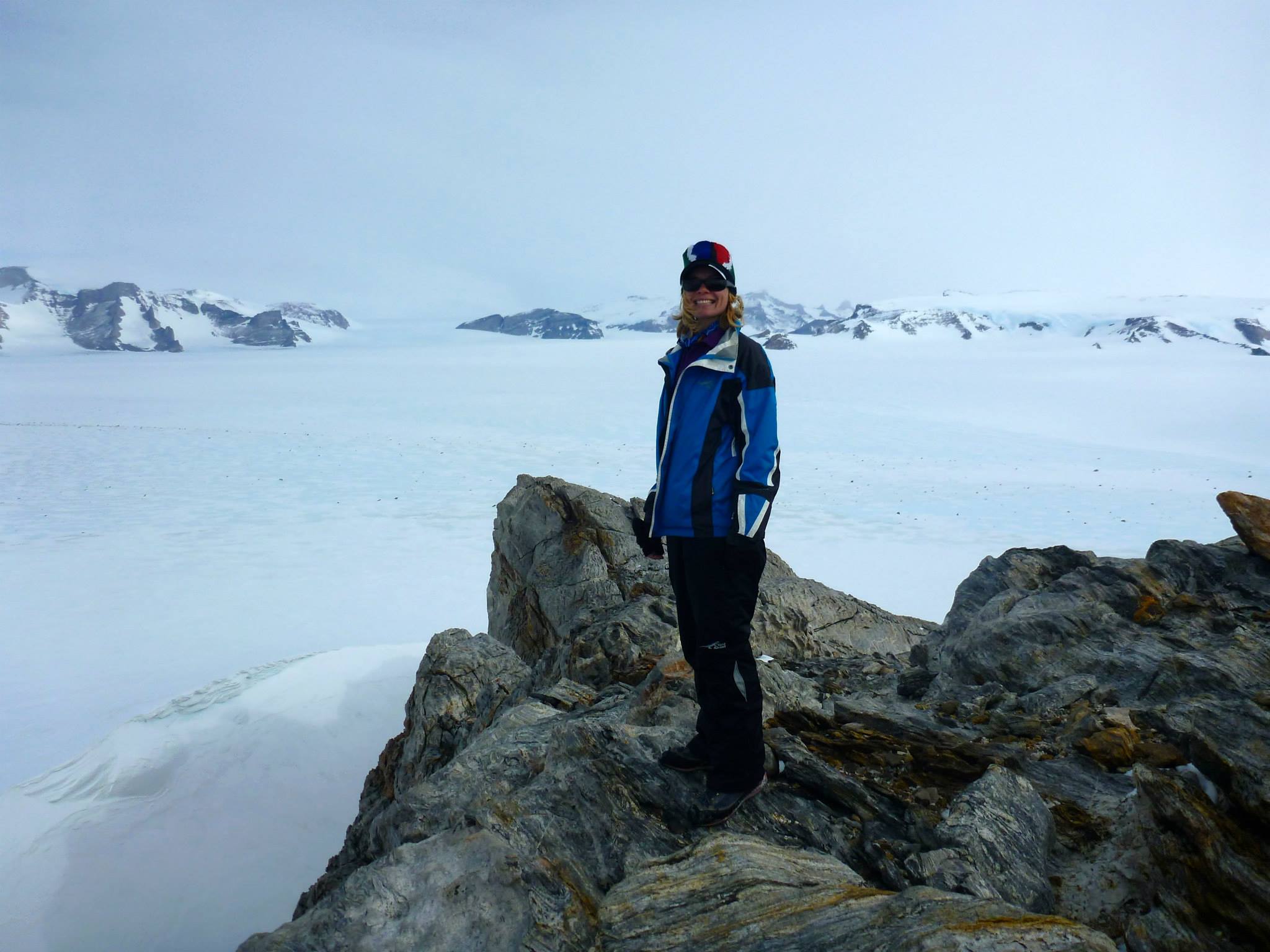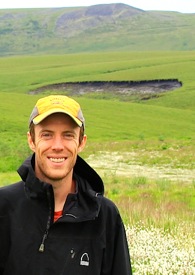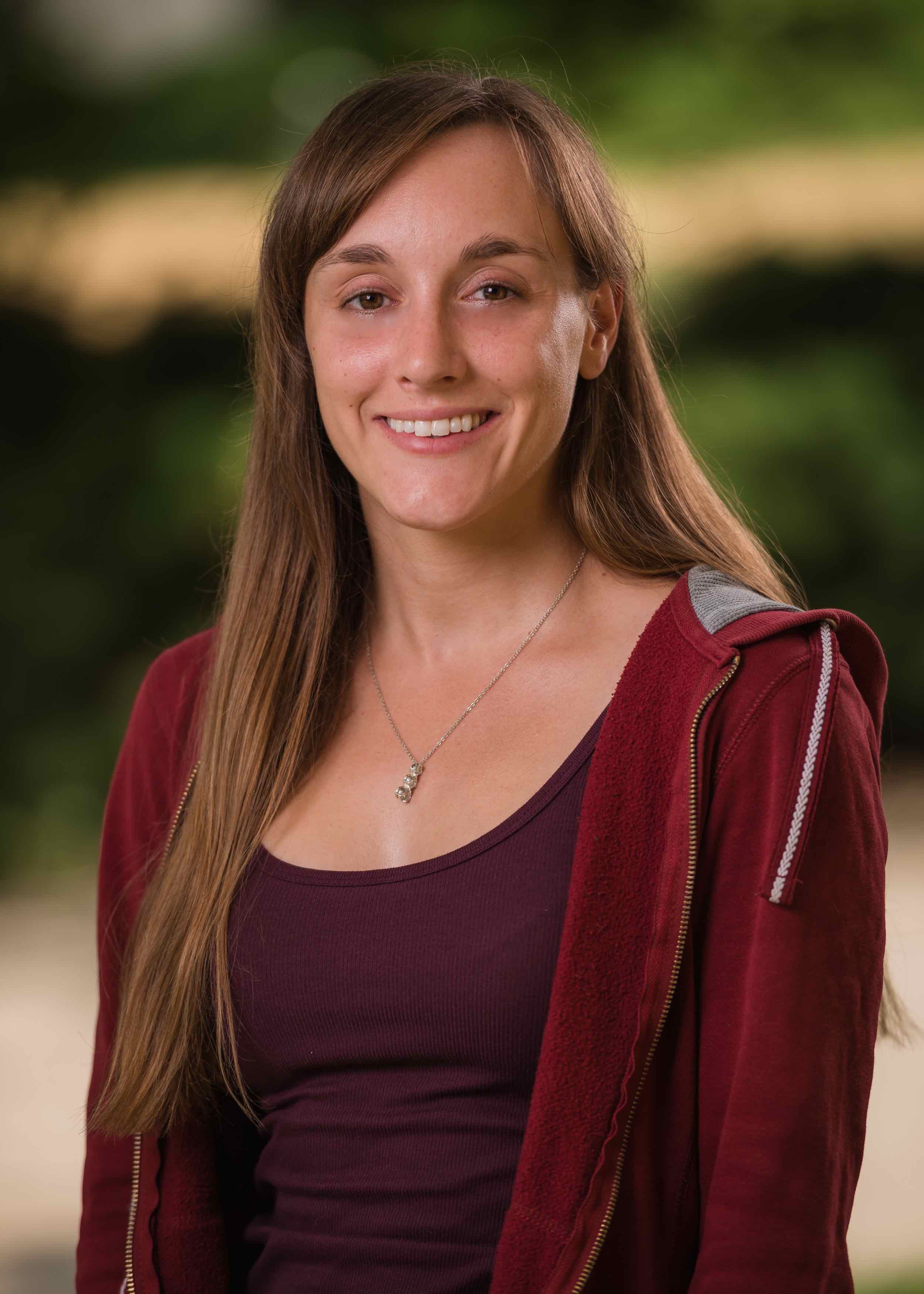 Since Jilda Caccavo was 9 years old, she considered marine biology as a potential career. After exploring neurobiology as an undergraduate, she began graduate studies toward a PhD in studying the molecular mechanisms of drug dependence. Becoming disillusioned with various aspects of biomedical research, Jilda turned her attention explored other passions, including interning on a farm, bartending, being a yoga instructor, and finally leaving New York, NY, USA to obtain her M.S. in Aquatic Ecology in London. There, she found that her nascent love marine biology (her first childhood toy was a penguin named Penny), was more than just skin-deep. She is now pursuing her a PhD at the University of Padua, Italy, investigating population connectivity in Antarctic fish.
Since Jilda Caccavo was 9 years old, she considered marine biology as a potential career. After exploring neurobiology as an undergraduate, she began graduate studies toward a PhD in studying the molecular mechanisms of drug dependence. Becoming disillusioned with various aspects of biomedical research, Jilda turned her attention explored other passions, including interning on a farm, bartending, being a yoga instructor, and finally leaving New York, NY, USA to obtain her M.S. in Aquatic Ecology in London. There, she found that her nascent love marine biology (her first childhood toy was a penguin named Penny), was more than just skin-deep. She is now pursuing her a PhD at the University of Padua, Italy, investigating population connectivity in Antarctic fish.
Jilda first joined the ranks of APECS in 2016, after registering for an early career researcher workshop hosted by APECS at the SCAR conference. After meeting some great APECS members like Alex Thornton and Gerlis Fugmann, she decided to apply to the APECS Council. Of the experience, Jilda says,
“I was still in Malaysia at the time, traveling after the conference, when I decided to put together an application for the Council on a plane from Langkawi to Singapore. A week later, back in an AirBnB in Kuala Lumpur prior to returning to Europe, I was being interviewed by Gerlis. As it would happen, I was accepted to the Council (as most enthusiastic applicants are), and started to put meeting dates in my calendar.”
Meanwhile, Jilda became involved in APECS Italy, working to reinvigorate their National Committee.
Shortly after this, after only recently joining APECS Council, Jilda was voted by the council to be a National Committee Coordinator. This means that she was responsible for coordinating between the many local branches of APECS and the international organization. During this time, she was also responsible for leading a Project Group tasked with gathering information for Non-Academic polar Careers. As an individual Council member, she also assisted in planning for Antarctica Day festivities and assisting in the IASC Fellowship review of applications. Of these times, Jilda remarks,
“Throughout my tenure in those roles, I continued to learn, to get to know the APECS leadership, embody that APECS tenet of engagement, and do what I could to help the organization and my fellow ECRs. It was these roles that led me to apply to be a member of ExCom for the 2017-18 term, and thanks to my fellow Council members, here I am today.”
While her roles on the Council and as a National Committee Coordinator, along with her role in her local National Committee, APECS Italy were enjoyable, she finds being on the Executive Committee to ultimately be the most rewarding experience. Being on the Executive Committee (ExCom) allows for involvement in a greater number of projects on the managerial level. Since joining ExCom, she has met more ECRs and helped to enhance the activities of Project Groups, allowing for our Council to more closely reach its potential.
Even while going above and beyond doing volunteer work with her time, Jilda finds that during the stressful time of completing her PhD the company of her fellow ExCom members has been helpful. On working with ExCom, Jilda comments,
“Hanne, Alex, Gabriela and Jean are awesome, not to mention the great Gerlis. I’m finishing up my PhD, and am often home alone with my cats in front of a computer screen, writing for hours. Being part of the APECS leadership, having these positive interactions, and being able to turn small efforts on my part into large output on the side of Council member activity in Project Groups, is a welcome reprieve!”
When Jilda was asked what she was most excited about, she said:
“Giving back to the community, and helping out. Sure, we’re helping ‘da earth’ with our work, but this is sand grain-size incremental. Sure, we help our bosses with grunt work, and we help students by training them, but this is part and parcel with the job of an ECR, be they a Masters, PhD or post-doc. And we’re often islands in these roles, give or take the more active student groups, or cohesive labs. But being part of APECS is above and beyond what is expected of an ECR, and participation in APECS is the veritable definition of symbiosis. You - members, leadership - we turn a bunch of independent organelles into a multi-faceted eukaryote, and we’re all the better for it.”
APECS serves as well as it is served by its volunteers. Jilda has some great ideas about this:
“To belabor the cell metaphor towards the end of my previous response - what’s in it for the chloroplast? Well, the cushy intracellular environment, that’s for one: the community of like-minded, friendly fellow ECRs with whom to communicate and collaborate on projects. Then there’s the facility of communication of opportunities. Depending on what level you’re involved in APECS, you may not just hear about all the latest opportunities for ECRs in the polar sciences, but you may be adjudicating who gets to receive those opportunities, or even creating them yourself. I got to take part in the most recent EPB meeting as rapporteur because of an APECS-announced call for this position, as well as departing for Tasmania for the MEASO conference in a few weeks to be an ECR session organizer, another opportunity awarded by APECS. But the way in which APECS helps you is not just with application opportunities. You know IASC, SCAR working groups, CCAMLR, EPB, any number of abbreviated bodies? All these groups work just like APECS. They bring like-minded experts with diverse backgrounds together to achieve discrete goals. I just remember being so starry-eyed at the EPB meeting with all the polar glitterati of Europe, and hearing them talk about ‘action items’ amongst their ‘ExCom’ and following their ‘agenda' and ‘voting'.. It sounds banal, but it makes a huge difference having actually participated in a group like this to understand, and eventually one day participate in ‘big kid’ organizations like these, and APECS prepares you for that, without a doubt.”
Featured: Jilda Caccavo
Author: Sara T. Strey
 Looking out at the Naukluft Mountains of her home in Namibia, Christel Hansen’s curiosity about the colors and shapes of the rock formations grew. This led her to begin in pursuit of the study of geomorphology. Having received her Bachelor of Science degree in Geoinformatics from the University of Pretoria in 2009, she further pursued a BS (Hons) in Environmental Analysis and Management from the University of Pretoria in 2010. Following her extended undergraduate studies, she went on to Rhodes University where she received her Master’s in periglacial studies and her PhD on periglacial processes and landforms, active layer and permafrost dynamics, thermal-moisture dynamics of seasonally frozen ground, using remote sensing and GIS in cold climates, as well as arid climate studies (both hot and cold deserts). Having completed her graduate work, she has returned as an instructor at the University of Pretoria.
Looking out at the Naukluft Mountains of her home in Namibia, Christel Hansen’s curiosity about the colors and shapes of the rock formations grew. This led her to begin in pursuit of the study of geomorphology. Having received her Bachelor of Science degree in Geoinformatics from the University of Pretoria in 2009, she further pursued a BS (Hons) in Environmental Analysis and Management from the University of Pretoria in 2010. Following her extended undergraduate studies, she went on to Rhodes University where she received her Master’s in periglacial studies and her PhD on periglacial processes and landforms, active layer and permafrost dynamics, thermal-moisture dynamics of seasonally frozen ground, using remote sensing and GIS in cold climates, as well as arid climate studies (both hot and cold deserts). Having completed her graduate work, she has returned as an instructor at the University of Pretoria.

 The University of Alberta is currently home to PhD Candidate, Scott Zolkos. As he studies the effects of thawing permafrost on carbon cycling in freshwaters, he is a great fit for his additional role as an International Arctic Science Committee Fellow in the Terrestrial Working Group. His interest in, and appreciation for, international collaborative polar research inspired him to join APECS in 2012, which has ignited his passion for education and outreach. From 2014-2017 Scott served on the APECS Council, taking up the position of Council Chair in 2015. Currently, he serves as the Ex-Officio has he has since 2017.
The University of Alberta is currently home to PhD Candidate, Scott Zolkos. As he studies the effects of thawing permafrost on carbon cycling in freshwaters, he is a great fit for his additional role as an International Arctic Science Committee Fellow in the Terrestrial Working Group. His interest in, and appreciation for, international collaborative polar research inspired him to join APECS in 2012, which has ignited his passion for education and outreach. From 2014-2017 Scott served on the APECS Council, taking up the position of Council Chair in 2015. Currently, he serves as the Ex-Officio has he has since 2017. Are you interested in what we can learn from water isotopes within ice cores taken from polar regions? So is Mathieu Casado. In fact, Mathieu has been preparing for such studies at several universities across Europe including Ecole Normale Supérieure Cachan, University Pierre and Marie Curie, Imperial College, and even the Institute of Geography of the Russian Academy of Sciences. In 2016, he completed his PhD at the Laboratoire des Sciences du Climat et de l'Environnement (LSCE). Following a year-long postdoctoral fellowship in France, Mathieu made his way to Germany to become a Humboldt Fellow at the Alfred Wegener Institute in Potsdam.
Are you interested in what we can learn from water isotopes within ice cores taken from polar regions? So is Mathieu Casado. In fact, Mathieu has been preparing for such studies at several universities across Europe including Ecole Normale Supérieure Cachan, University Pierre and Marie Curie, Imperial College, and even the Institute of Geography of the Russian Academy of Sciences. In 2016, he completed his PhD at the Laboratoire des Sciences du Climat et de l'Environnement (LSCE). Following a year-long postdoctoral fellowship in France, Mathieu made his way to Germany to become a Humboldt Fellow at the Alfred Wegener Institute in Potsdam. In 2011, at the start of her first postdoctoral position, Ruth Vingerhagen (née Hindshaw), joined the ranks of APECS. With a Master’s degree in chemistry from Edinburgh University, and a PhD in geochemistry from ETH Zürich, Ruth’s research largely focuses on using metal isotopes to understand the temporal and spatial variations of river water chemistry, particularly rivers draining glaciated and permafrost-dominated catchments. All while completing three post-doctoral positions at NGU in Norway, University of St. Andrews, and the University of Cambridge, she also has two children.
In 2011, at the start of her first postdoctoral position, Ruth Vingerhagen (née Hindshaw), joined the ranks of APECS. With a Master’s degree in chemistry from Edinburgh University, and a PhD in geochemistry from ETH Zürich, Ruth’s research largely focuses on using metal isotopes to understand the temporal and spatial variations of river water chemistry, particularly rivers draining glaciated and permafrost-dominated catchments. All while completing three post-doctoral positions at NGU in Norway, University of St. Andrews, and the University of Cambridge, she also has two children.
 Since Jilda Caccavo was 9 years old, she considered marine biology as a potential career. After exploring neurobiology as an undergraduate, she began graduate studies toward a PhD in studying the molecular mechanisms of drug dependence. Becoming disillusioned with various aspects of biomedical research, Jilda turned her attention explored other passions, including interning on a farm, bartending, being a yoga instructor, and finally leaving New York, NY, USA to obtain her M.S. in Aquatic Ecology in London. There, she found that her nascent love marine biology (her first childhood toy was a penguin named Penny), was more than just skin-deep. She is now pursuing her a PhD at the University of Padua, Italy, investigating population connectivity in Antarctic fish.
Since Jilda Caccavo was 9 years old, she considered marine biology as a potential career. After exploring neurobiology as an undergraduate, she began graduate studies toward a PhD in studying the molecular mechanisms of drug dependence. Becoming disillusioned with various aspects of biomedical research, Jilda turned her attention explored other passions, including interning on a farm, bartending, being a yoga instructor, and finally leaving New York, NY, USA to obtain her M.S. in Aquatic Ecology in London. There, she found that her nascent love marine biology (her first childhood toy was a penguin named Penny), was more than just skin-deep. She is now pursuing her a PhD at the University of Padua, Italy, investigating population connectivity in Antarctic fish. Before we celebrate some of our outstanding members for their service to APECS, it is important to remember our leadership structure. The
Before we celebrate some of our outstanding members for their service to APECS, it is important to remember our leadership structure. The 

